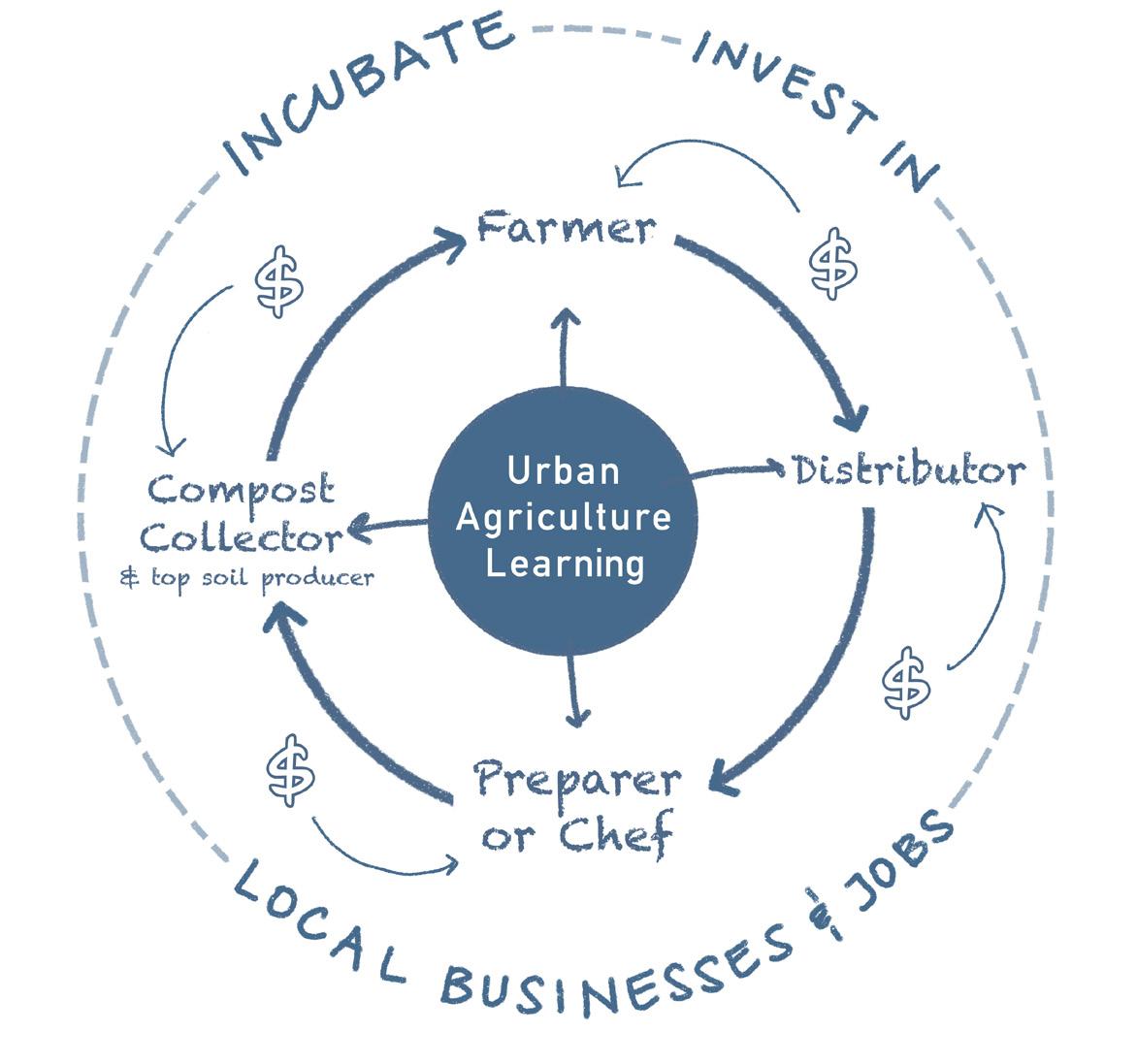
20 minute read
HOW PHILADELPHIA APPROACHES FOOD WASTE REDUCTION AND RECOVERY
Today the City of Philadelphia works with residents, community organizations, nonprofits, businesses, and institutions to reduce and recover food waste. In 2017, Philadelphia adopted a Zero Waste goal and published the Zero Waste Action Plan which aims to move the city toward a waste- and litter-free future. The plan calls for a complete phase out of landfills by 2035. However, in 2020 amid COVID-19 pandemic budget cuts, the City disbanded its Zero Waste and Litter Cabinet, which Mayor Kenney created in 2016 to coordinate citywide efforts to reduce litter and waste. The Philadelphia Office of Sustainability (OOS) sets the City’s agenda for a more sustainable future. Through its Greenworks plan, OOS helps other City agencies work toward goals that include:
> Increasing access to healthy, affordable, sustainable food
Advertisement
> Reducing carbon pollution
> Eliminating waste

> Supporting training, employment, and business opportunities focused on sustainability
Case Study
HOW CAN FOOD WASTE BE REUSED?
The US Environmental Protection Agency defines priority areas for food recovery with its Food Recovery Hierarchy, which outlines strategies from the most environmentally preferred to the least preferred.84 These are: source reduction (most preferred), feeding hungry people, feeding animals, industrial uses, composting, and incineration or landfill (least preferred). In Philadelphia, the second most preferred strategy (feeding hungry people) often involves redirecting food to organizations that need it, such as Food Connect and Grocers Against Hunger Philabundance, and Sharing Excess
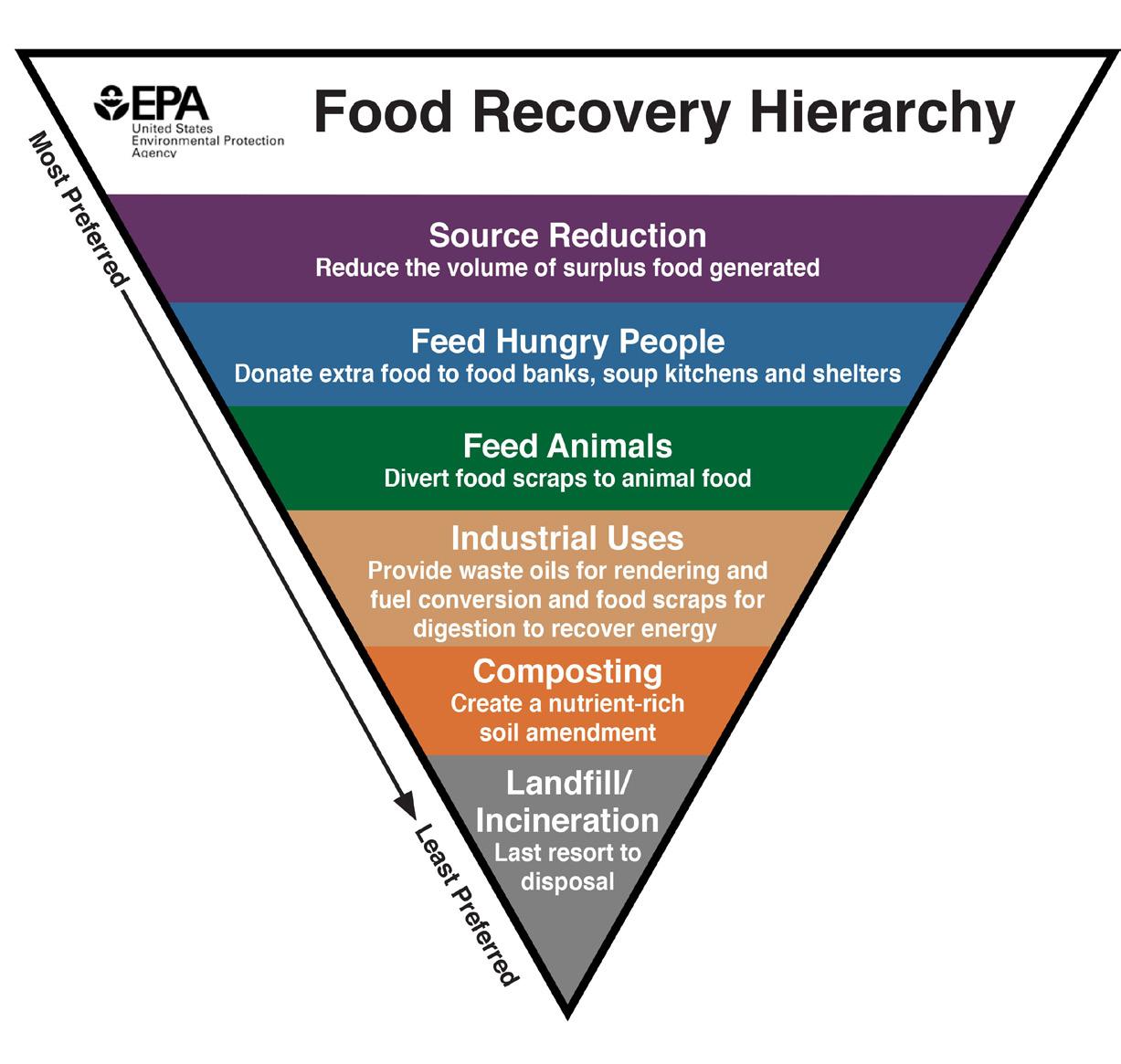
To tackle food waste in Philadelphia, OOS joined the Natural Resources Defense Council’s Food Matters Regional Initiative in 2020 to pursue new strategies to reduce food waste in the Mid-Atlantic region. Through this initiative, OOS is developing an educational campaign for residents that is informed by community focus groups, and aims to increase public awareness of the impacts of food waste and how Philadelphians can take action to prevent it. The campaign launched on Earth Day in 2022, and will be promoted across the city at bus stops, in grocery stores, and on social media.
OOS is also piloting a Food Waste Business Challenge, which encourages local businesses to work one-onone with the OOS to implement a food waste action plan and test waste-reducing strategies. Throughout the process, businesses can provide feedback to the City that will inform policy and programs for food businesses in the future.
Currently, the Philadelphia Water Department (PWD) provides the City’s largest-scale solution for diverting food waste from the municipal waste stream: in-sink garbage disposals allow residents to put food scraps down the kitchen sink, and that waste is processed with sewage at PWD’s facilities and converted into organic fertilizer and renewable energy (e.g., gasses from waste that create electric power). In 2012, PWD entered a 20-year contract for a public-private partnership with Synagro, a company that operates the Philadelphia Renewable Bio-Fuels Facility. The facility converts sewage and food waste from in-sink garbage disposals processed at PWD’s wastewater treatment plant into more than 50,000 tons of fertilizer pellets each year, which can be used to fertilize food crops for animal or human consumption throughout the East Coast. The partnership not only recovers and recycles food and human waste, but also reduces the costs of and greenhouse gas emissions caused by trucking waste away from homes and businesses and disposing of it in landfills.85
In 2018, the Philadelphia Streets Department published the Philadelphia Organics Diversion Feasibility Study86 to explore ways to divert organic materials, including food waste, from the municipal waste stream. The study explored what it would take to develop a largescale regional composting operation in the City, and looked at the feasibility of City collection of leaves and yard waste, food waste, and compostable paper; commercial business and institutional composting requirements to reduce waste; community-based and -led composting programs; and in-sink food garbage disposals as a solution to residential food waste. The study concluded that successfully reducing organic waste in Philadelphia will require a combination of all of these actions, as well as new strategies, working together into the future.
The study also explored municipal curbside compost pickup, which has become popular in cities across the country, but found that it is too costly in Philadelphia today. While municipal curbside compost collection remains a long-term option, the Streets Department lacks the budget for more drivers, waste management staff, and a new fleet of trucks to collect separated food and yard waste from Philadelphia homes and businesses. In addition, the City would need facilities large enough to process the amount of organic waste generated in Philadelphia. Partnering City agencies are exploring strategies to overcome these challenges, including public-private partnerships and decentralized and community-led approaches to offering composting services to residents.
Philadelphia Parks & Recreation (Parks & Rec) has found three successful ways to increase resident and recreation center composting activities, tackling both yard waste and food scraps.
> Parks & Rec operates the Fairmount Park Organic Recycling Center, which has received and processed yard waste for over 50 years. Businesses can pay a tipping fee to drop off leaves, grass clippings, brush, herbivore manure, and wood chips. Residents can drop off bagged leaves and yard waste on designated days at the Streets Department’s sanitation convenience centers or place them out for curbside pickup by City trucks on special collection days each fall. City residents and growers can get up to 30 gallons of free organic materials including screened leaf compost, shredded wood mulch, herbivore manure, wood chips, and firewood. These materials are available for purchase by businesses.
> In 2019, Parks & Rec launched the Community Compost Network, which currently supports composting at 13 sites across Philadelphia. Parks & Rec aims to grow the program to 25 sites citywide, inviting the community to compost their food and yard waste at their neighborhood site. Parks & Rec provides a full range of support for these community-led and resident-powered projects, from in-person and virtual training, educational materials, every basic tool to compost start-to-finish and composting bins, as well as scales and binders for measuring and recording organic waste collected. Parks & Rec has also developed its Community Compost Manual, a blueprint for any group interested in developing a plan and infrastructure for grassroots community-led compost collection. This manual will be published online and in print as a resource for residents and municipalities across the country, as it also details how Philadelphia established its network.
Helpful Guides On Food Waste For Food Businesses
Similarly, programs within the School District of Philadelphia are finding ways to keep organic waste out of landfills and educate students in the process.87 At Henry Got Crops, located at W. B. Saul High School of Agricultural Sciences, the composting program processes manure from the school’s livestock and Philadelphia Zoo animals, as well as food scraps from three local composting companies, three Weavers’ Way Co-op stores, coffee grounds from High Point Coffee, and grain from six area breweries, which is also fed to Saul’s dairy cows. Students at Penn Alexander Elementary School, like Saul students, separate out food waste from trash during school meals. A new partnership among Parks & Rec’s Fox Chase Farm, Reading Terminal Market, and Urban Worm Company is teaching students about vermicompost while launching a composting operation at Reading Terminal Market run by urban agriculture students from Philadelphia public schools.88
Case Study La Compost
Photosource:CityofPhiladelphia
In summer 2021, the Philadelphia Office of Sustainability (OOS) published a number of educational materials for food businesses, including a guide on Food Waste Management for Commercial Properties and a Zero Waste Guide for Food Service Establishments
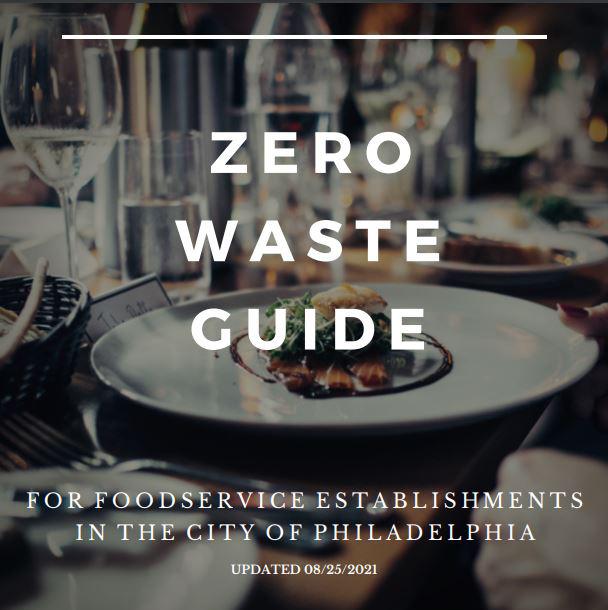
On Earth Day 2022, OOS launched a new campaign, Eat Away at Food Waste, with resources for households and businesses.
> In 2021, Parks & Rec launched a pilot program in partnership with the private company Bennett Compost to collect and compost food scraps from meals served at 25 City recreation centers To make this program possible, Parks & Rec worked with the Pennsylvania Department of Environmental Protection (PADEP) to modify the State’s existing On-Farm Composting permit to include farms or urban sites as small as 0.7 acres, which will reduce hauling distances and emissions for organic waste. Bennett established a composting facility on a former Parks & Rec maintenance yard, where they process the food scraps collected from rec centers along with those from Bennett’s 5,000 residential and commercial customers. Parks & Rec plans to grow the program, adding 25 to 30 sites per year until all after-school and summer camp programs are composting.
Photosource:L.A.Compost

LA Compost is a community-based nonprofit that shows one way community-led efforts can play a role in reducing food waste. The organization is a POC-owned compost project working across Los Angeles County to educate residents and provide resources related to food waste. LA Compost “supports a healthy transition where food is never wasted, but returned to the soil for the next cycle of life.” It provides jobs, education, and resources, as well as access to community compost hubs. “The healthy soil that is created by a community compost hub stays in the community and is used locally to enrich the soil in the neighborhood in which it was created.”
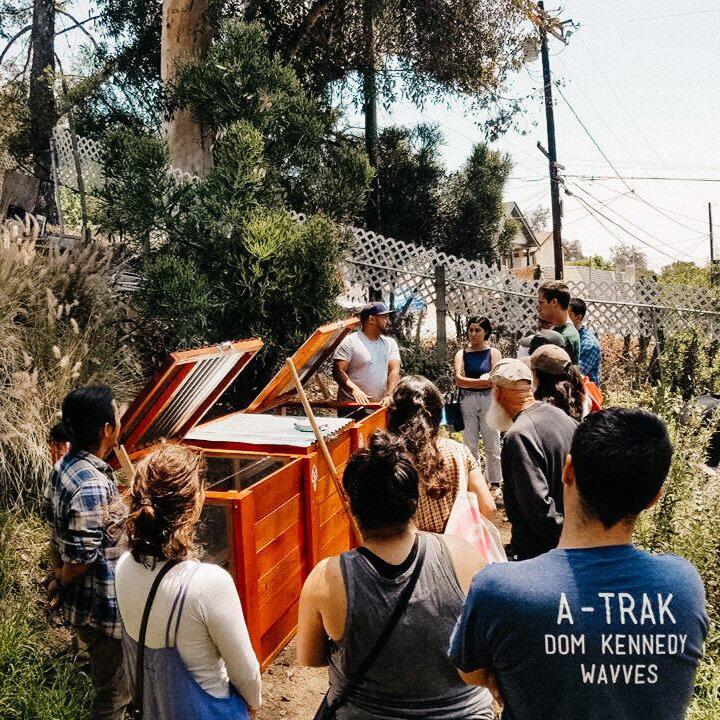
Philadelphia Department of Prisons runs a closed-loop composting system, taking food waste generated from all six correctional facilities in the City’s prison system (approximately 900 tons per year)89 and converting it to compost for use within the department’s agricultural program. The department built its composting facility at the former Holmesburg Prison with funding from the Philadelphia Office of Sustainability’s Greenworks Sustainability Fund. The inmate-run composting operation provides vocational training to help formerly incarcerated residents find jobs.
Aside from the City’s efforts to advance composting and other food waste reduction and recovery initiatives, private compost companies are growing, offering curbside food waste pick-up for households who can afford to pay for the service. Many restaurants are also aware of the importance of reducing their food waste, and they try to incorporate as much of each food product into their meals as possible (e.g., using vegetable scraps to make broth). Individual gardens and farms also play a large role in reducing food waste by maintaining their own composting operations.
The Gravy Trucks Of Philadelphia
Potential For Change

Pigseatamealofscrapproducesourcedfrom BaltimoreCity’sOfficeofSustainability,which collectsfoodscrapsfromresidentsevery weekend at farmers markets for animal feed Source: Kenneth K. Lam for The Baltimore Sun
Did you know that as recently as 1995 many Philadelphia residents had the option to direct their food waste to hog farmers in New Jersey who would feed the table scraps to their livestock?90
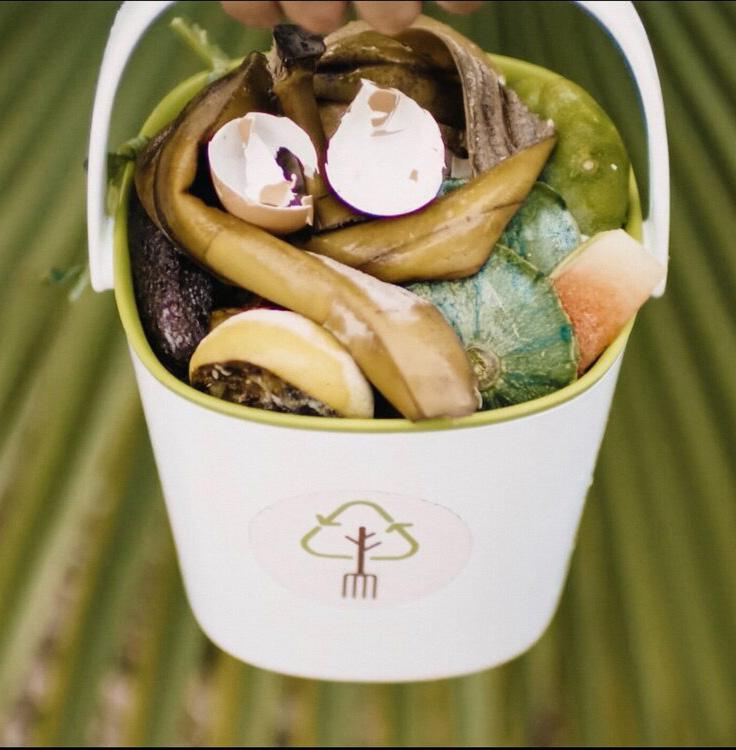
Between 1920 and 1995, the City’s Sanitation or Streets Department paid pig farmers in southern New Jersey to collect table scraps from galvanized buckets placed curbside by Philadelphia residents twice a week. The optin program covered roughly three-quarters of the city, and resulted in the collection of over 24,000 tons of food waste each year from roughly 2,000 households in the mid90s,91 costing the City less than half of what it would have cost to send the scraps to a landfill. According to a Streets Department supervisor in the 1990s, Philadelphia was the only remaining city in the country with such a program, then called “Waste-for-Pigs.”
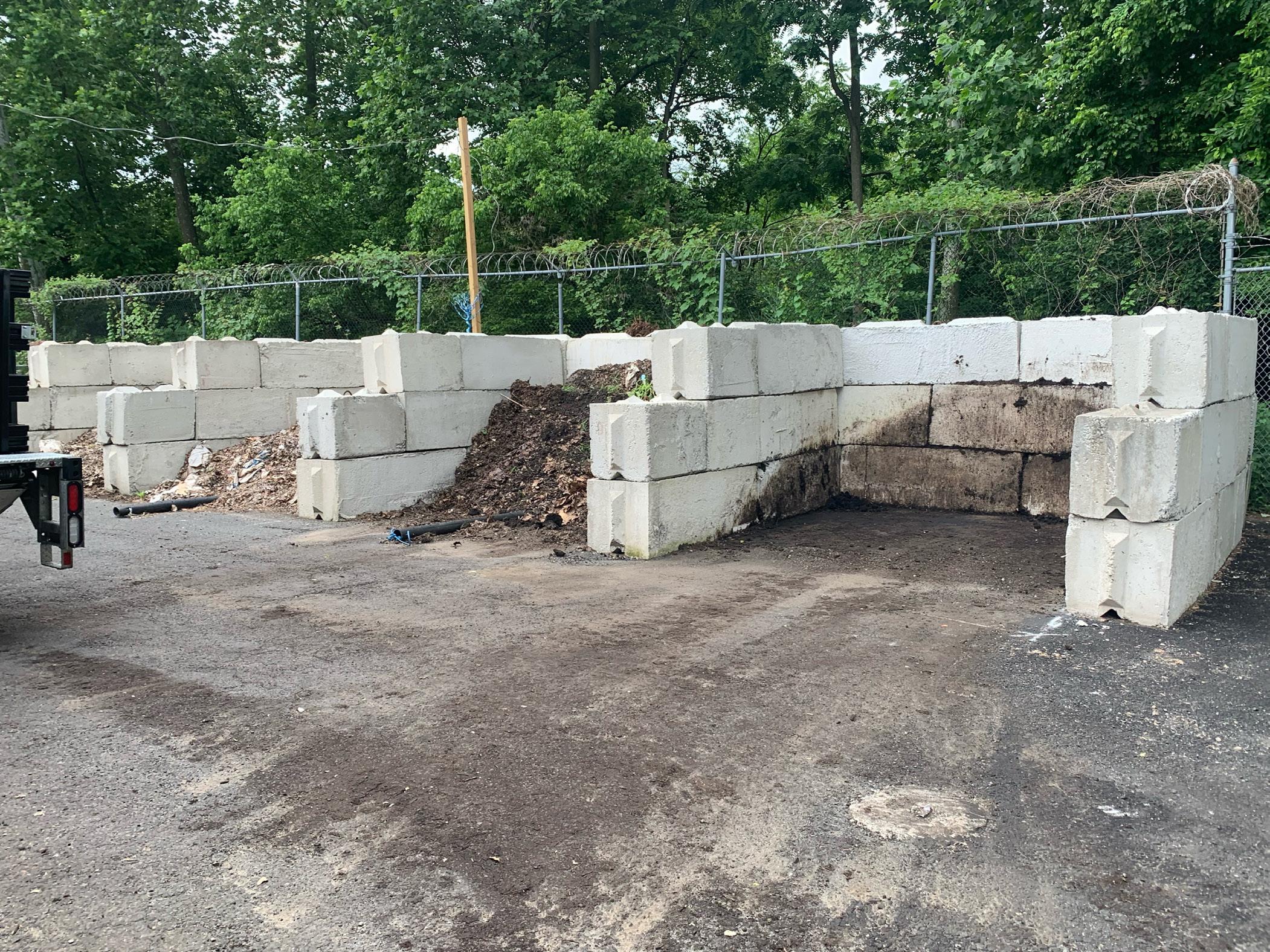
At its peak—before home garbage disposals, increased reliance on packaged and processed foods, and composting—the program sent over 100,000 tons of food waste per year to hog farms in New Jersey, but the program dwindled as suburban development drove pig farmers from the area and consumer habits changed.
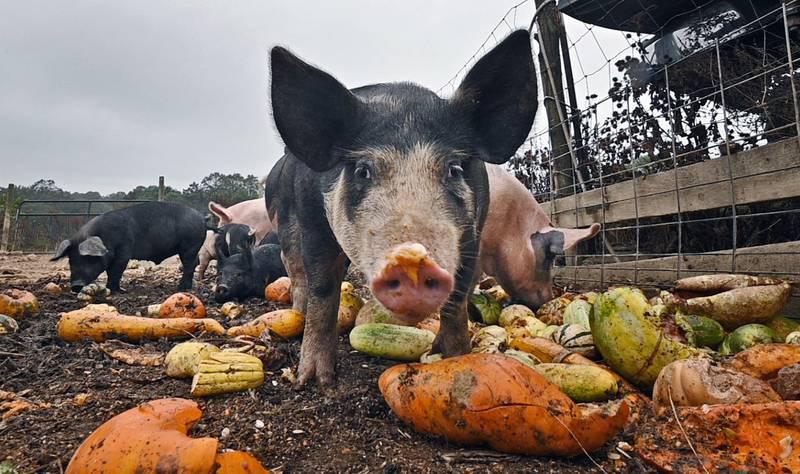
To accomplish Philadelphia’s Zero Waste Action Plan goal of completely phasing out landfills by 2035, reducing the amount of organic food waste generated in the city is critical, with the potential to lessen the municipal waste stream by up to 37 percent. Waste reduction at this scale will require citywide initiatives as well as small-scale efforts from businesses, neighborhoods, and individual households to divert organic materials (e.g., food scraps, yard waste, and manure) away from landfills and turn them into compost or other useful products.
Local government’s role in managing waste and exploring internal policies can help divert food waste from landfills to productive public uses and save money. Additional, educating the public on their role in this process can shift public habits helping to reduce the largest single source of food waste: residential households.
Food Waste Recommendations
The recommendations in this chapter focus on reducing food waste from different sources and diverting it from the municipal waste stream. They encourage the City to uphold existing zero waste commitments, propose expanding the range of policies and programs for sustainable waste reduction and recovery practices at different scales, encourage economic development in agriculture and related sectors, and reduce the amount of food wasted in Philadelphia. The recommendations support four main objectives:
> Improve and expand City operations to recover food waste
> Increase resident, business, and institutional participation in food waste reduction
> Invest in sustainable food waste management technologies and systems
> Prevent food waste by increasing food rescue and donations
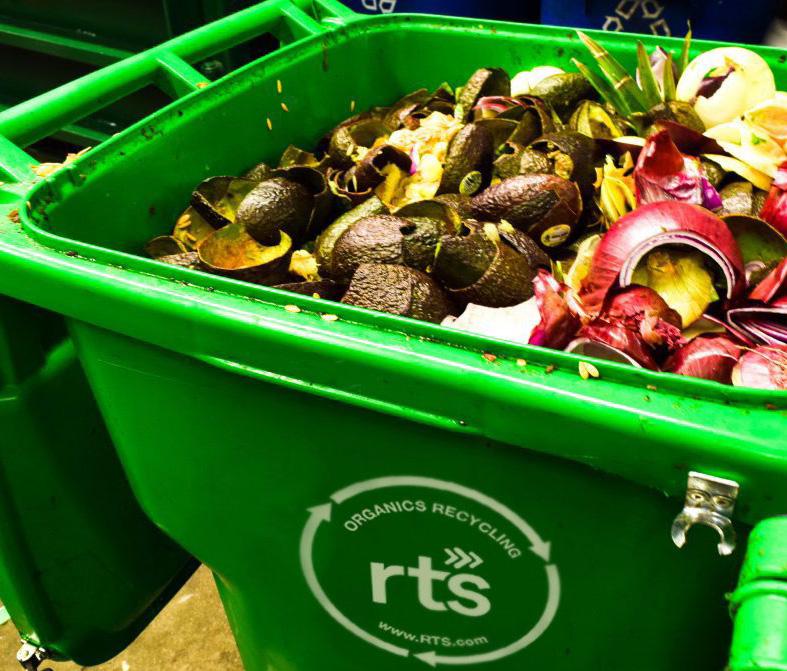
RECOMMENDATION / ACTION STEP

Improve and expand City operations to reduce food waste.
5.1 Continue to seek sustainable waste management solutions within Streets Department and Water Department operations.
Explore options to extract organics from the municipal solid waste stream to separate organics before they enter the waste stream. Specifically, work with large producers of organic waste (e.g., groceries, farms, farmers markets, restaurants, large public events, zoo, stadiums, etc.).
Investigate additional funds (e.g., staff, fleet, and processing) to pilot a curbside compost pick up program in select neighborhoods.
Invest in necessary capital upgrades (e.g., digester mixing and sludge screening) to improve PWD’s anaerobic digesters and promote a more robust digestion process, making the concept of food waste co-digestion more feasible.
Investigate the establishment of a public private partnership with business entities to haul and process intercepted food waste into usable food slurry that can be safely introduced into PWD’s anaerobic digestion or another merchant digestion facility. Continue to increase bio-gas yields and fertilizer through advanced digestion processes.
5.2 Attract additional resources to expand operations at Parks & Rec’s Fairmount Park Organic Recycling Center to support home gardens, community gardens, and farms, as well as other agriculture projects within the city.
Allocate more staff and invest in necessary capital upgrades (e.g., additional equipment) at the Center to adequately expand the operations of the facility.
Establish a leaf bank to store fall leaves for residents who are engaging in composting or mulching and need brown materials.
Develop a potting soil mix for residents, City agencies, and businesses.
Remain committed to exploring operational costs and resources to increase the center's ability to pick-up and deliver organic material (e.g., compost, soil, mulch) to new and existing gardens and farms. Develop a new urban agriculture operations crew to increase services to community gardens and farms in the city, including delivery of organic materials.
Create a local wood lumber yard for residential and private business from downed trees in the park system, and offer growers free lumber and wood chips for farms and gardens.
TYPE OF CHANGE LEAD AGENCY & PARTNERS TIMELINE
Operations Streets Dept, PWD, Office of Sustainability
Operations, Partnership Streets Dept, Office of Sustainability, Institutions, Businesses
Budget Streets Department, Finance, City Council, Office of Sustainability
Budget, Partnership PWD, Finance, City Council
Budget, Partnership PWD, Finance, City Council, Area Businesses
CASE STUDY COMMERCIAL ORGANICS REGULATIONS, NEW YORK
Long-Term
Medium-Term
Long-Term
Long-Term
Long-Term
Operations Parks & Rec, Finance, City Council Short-Term
Budget Parks & Rec, Finance, City Council Medium-Term
Operations Parks & Rec Short-Term
Operations Parks & Rec Short-Term
Operations Parks & Rec, Finance, City Council Medium-Term
Operations Parks & Rec, Finance, City Council, Funders Medium-Term
New York City and New York State’s commercial organics regulations demonstrate how policy targeting businesses and institutions can curb food waste effectively. The regulations mandate that food scraps–generating businesses and institutions over certain sizes must separate and recycle their organic waste from other trash and recycling. This includes colleges and universities, restaurants, food stores, correctional facilities, malls, sports venues, hotels and motels, and more. This helps reduce organic waste in landfills emitting methane gas, and keeps food scraps from being liquefied and drained into the sewer system.
RECOMMENDATION / ACTION STEP
5.2 cont’d Partner with local research institutions to explore the use of recycled materials (e.g., glass) as growing mediums for plants for other agricultural uses.
5.3 Encourage all City operations to adopt composting practices to divert organic waste from the waste stream and lessen municipal landfill costs.
Develop comprehensive educational materials and guidelines to structure municipal composting efforts within City government, and cultivate support and buy-in across agency leadership. Clarify how recycling and food waste regulations apply to building operators of major meal providers (e.g., School District, Parks & Rec).
Explore funding opportunities to create a compost training program for formerly incarcerated individuals.
Scale up Parks & Rec’s public private partnerships for composting food waste from recreation center programs to include additional sites within Parks & Rec’s system.
Expand municipal composting of food waste to other City agencies and entities engaged in meal provision and food service.
Work with the Philadelphia International Airport to develop a closed-loop food waste composting and recyclables operation.
5.4 Find opportunities to work with the School District of Philadelphia and other City meal providers (e.g., prisons) to integrate food waste reduction and recovery measures.
Consider joint development of operational and educational guidance across youth programming agencies (e.g., School District, Parks & Rec, Libraries) for standard operating procedures around recycling and composting, perhaps with Saul Agricultural High School as a pilot.
Support source-separating programs within individual schools, and connect the district with area businesses and sites poised to receive properly sorted food waste for compost creation. Work with Food Services to get buy-in internally within the district.
Undertake a waste audit in school cafeterias throughout the district as well as prison cafeterias to better understand dietary preferences and common sources of food waste. Collaborate on data collection strategy, goals, and metrics, and design the process together with food services.
5.5 Identify sites where composting can occur in or near Philadelphia to close the loop within the city’s food system.
Develop educational materials about well-managed composting sites and successes from Parks & Rec’s Organic Recycling Center and partnership with Bennett Compost to address public concerns about nuisance issues and demonstrate feasibility.
Work with the City’s land holding agencies, Commerce Department, and PIDC to find a selection of geographically distributed, suitable, small- to mid-sized sites (e.g., Sanitation Convenience Centers) for commercial composting facilities in Philadelphia.
Partner with nonprofits and skilled trades organizations (e.g., PowerCorpsPHL) who maintain facilities and workforces well-positioned to support, sustain, and encourage use of local composting operations (e.g., PHS’s Green Resource Centers). Partner with local environmentally focused skilled trades organizations (e.g., Energy Coordinating Agency), to expand their technical training programs to include sustainable construction (e.g., solar and waste systems) for urban agriculture.
Type Of Change
LEAD AGENCY & PARTNERS TIMELINE
Partnership Parks & Rec, Area Universities, Nonprofits, Area Businesses
Administrative Mayor's Office, Office of Sustainability, Parks & Rec, Office of Children & Families, Office of Homeless Services, Prisons, Streets
Administrative Sustainability, Streets, Parks & Rec, Mayor’s Office, School District
Operations, Budget Prisons, Streets
Partnership Parks & Rec
Operations Children & Families, Homeless Services, Parks & Rec, Streets
Medium-Term
Long-Term
Medium-Term
Medium-Term
Medium-Term
Long-Term
Operations Office of Sustainability, Airport Long-Term
Operations School District, Prisons, Office of Sustainability, Parks & Rec
Partnership School District, Office of Sustainability, Parks & Rec
Partnership School District, Office of Sustainability, Area Businesses
Operations School District, Prisons, Office of Sustainability
Operations Planning & Development, PIDC, Commerce Dept, Parks & Rec, Streets, Office of Sustainability
Medium-Term
Medium-Term
Short-Term
Medium-Term
Short-Term
Operations Parks & Rec, Area Businesses Short-Term
Operations Planning & Development, PIDC, Commerce, Streets, Parks & Rec, Sustainability
Partnership Nonprofits, Office of Sustainability
Medium-Term
Medium-Term
RECOMMENDATION / ACTION STEP TYPE OF CHANGE LEAD AGENCY & PARTNERS TIMELINE
Increase residential, business, and institutional participation in keeping food waste out of the trash.
5.6 Support at-home solutions to help residents reduce food waste.
Invest in expanding the newly launched Phila.gov/FoodWaste website to develop a comprehensive Food Waste Resource Hub online, and share more accessible information about public composting sites (Parks & Rec Community Compost Network) and private compost companies available for hire by households who can afford it.
Consider developing a City program to provide in-sink garbage disposals for interested households (e.g., PWD’s Rain Check Program, which provides free rain barrels for residents to capture stormwater), requiring education and communication about best practices for usage. Increase educational and promotional campaigns for proper usage of garbage disposals and what types of food waste can be grinded to prevent issues caused by misuse.
Bring back the program offered by the Streets Recycling Office that provides free compost tumblers for interested households who attend a training (e.g., Parks & Rec’s Tree Philly free yard tree program).
Fundraise and partner with area businesses for composting scholarships for households who cannot afford private compost pick-up services but would like to participate, and provide free compost tumblers or bins for interested residents, as with the City's blue recycling bins offered at no cost to residents.
5.7
Launch an educational campaign about how and what to compost, targeting a range of audiences, including residents, businesses, and institutions.
Expand the Office of Sustainability’s newly launched Eat Away at Food Waste educational campaign, created in partnership with the Natural Resources Defense Council, to include education for the public about the benefits of composting, what materials can be composted safely, how to compost and vermipost, and where to do so.
Provide more education about existing yard-waste composting services offered at the Fairmount Park Organic Recycling Center.
Involve organizations, businesses, and residents who keep animals and participants in the local compost network in food waste reduction conversations to integrate animal waste in composting operations and direct food scraps for animal consumption.
Continue the Office of Sustainability’s community conversation series with residents to understand the neighborhood-level interests in and barriers to food waste reduction and composting resources.
Collaborate with the School District’s GreenFutures program in the planning, development, and roll-out of outreach campaigns to explore ways to engage students, families, and education experts.
5.8 Expand opportunities for community-scale composting.
Designate additional sites for community-scale composting through Parks & Rec’s Community Compost Network, where residents can drop off food scraps and other organic waste at no cost to neighborhood community gardens, farms, schools, and other public spaces.
Explore the feasibility of collaborating with local nonprofits, area businesses, and community organizations to develop a residential food scrap drop-off program within Farmers Markets in the City.
Provide food waste pick-ups to community and nonprofit organizations hosting large public events that will generate a significant amount of food waste.
Operations Office of Sustainability
Operations Office of Sustainability
Medium-Term
Short-Term
CASE STUDY CLEAN KITCHEN, GREEN COMMUNITY
Operations PWD, Office of Sustainability
Medium-Term
Operations Office of Sustainability, Streets
Budget Office of Sustainability, Area Businesses, Funders
Medium-Term
Long-Term
Operations Office of Sustainability Short-Term
Operations Office of Sustainability, Parks & Rec Short-Term
Operations Parks & Rec Short-Term
Partnership Nonprofits, Grassroots Orgs, Local Growers, Area Businesses
Short-Term
Administrative Office of Sustainability, Parks & Rec Short-Term
Partnership Office of Sustainability, School District Short-Term
Operations Parks & Rec Medium-Term
Operations Parks & Rec Medium-Term
Operations, Partnership Parks & Rec, Dept of Public Health, EHS, Nonprofits, Grassroots Orgs, Area Businesses
Operations Streets Dept, Grassroots Orgs, Nonprofits
Medium-Term
In 2013, the Philadelphia Water Department participated in a five-city pilot project funded by InSinkErator, a garbage disposal manufacturer, studying The Food Waste DisposerasMunicipalToolforWasteDiversion InSinkErator installed 173 garbage disposals in the kitchen sinks of participating residents in Philadelphia’s Point Breeze and West Oak Lane neighborhoods and encouraged residents to put grindable food waste down the drain. The project reported a 30 percent reduction in trash volume over three years,92 demonstrating one example of a simple strategy for reducing food waste--and a public-private partnership to explore its impact.
Medium-Term
RECOMMENDATION / ACTION STEP
5.9 Invest in the local economy to provide sustainable waste management solutions in Philadelphia, while investing in and creating local businesses and jobs.
Type Of Change
LEAD AGENCY & PARTNERS TIMELINE
Partnership Streets Dept, Commerce Dept, Office of Sustainability, Office of Economic Opportunity, Office of Children & Families, Parks & Rec, School District, Office of Homeless Services, Area Businesses
Medium-Term
Explore ways to offer discounted lease rates or public/private partnerships to local businesses qualified to operate local composting sites on City land. Prioritize BIPOC, women, LGBTQIA, disabled, and/or immigrantowned enterprises.
Invest in and support local food waste and food recovery businesses, and diversify business operators offering competitive and consistent revenue streams to emerging businesses. Prioritize businesses that are BIPOC, women, LGBTQIA, disabled, and/or immigrant owned.
Administrative Mayor’s Office, Parks & Rec, Streets, PIDC, Philadelphia Land Bank
Administrative Office of Economic Opportunity, Streets, Parks & Rec, Office of Homeless Services, Office of Children & Families, School District
Medium-Term
Medium-Term
Invest in composting as a business enterprise by partnering with community-based organizations, nonprofits, and skilled trades organizations to develop a training program focused on cultivating skills for food waste processing and distribution. Specifically, create a diverse learning experience and curriculum by including modules focused on youth and individuals with disabilities.
Operations Nonprofits, Grassroots Organizations, Office of Economic Opportunity, Mayor’s Office of Youth Engagement, Mayor’s Office for People with Disabilities
Medium-Term
Assess the Streets Department’s OrganicsDiversionFeasibilityStudy and work with local area businesses and nonprofits to identify business opportunities and gaps in the local economy and market, assessing food waste from haulers to processors, and producers of new products made with recovered waste or recyclable materials.
5.10 Incentivize major institutions and businesses (e.g., the City, hospitals, universities, major employers, and food businesses) to comply with existing food waste diversion policies/mandates and to adopt complete organic waste recycling.
Clarify and disseminate guidance about existing Commercial Organics diversion rules that require businesses and institutions generating food waste to divert grindable food waste away from the landfill.
Explore ways to increase enforcement and oversight of existing Commercial Organics diversion rules.
Pass legislation to adopt Commercial Organics rules that require businesses and institutions to sourceseparate their organic waste for compost, aerobic or anaerobic digestion, or other approved processing methods, either to be outsourced to a private processor or processed on-site. Begin with large facilities over 25,000 square feet, and phase in all food scrap-generating institutions and businesses over multiple years.
Connect institutions and businesses with existing composting businesses in the private sector to encourage procurement of composting services, and with resources and education to prevent food waste.
Provide education and support for institutions with large footprints (e.g., universities, museums, the Navy Yard, stadiums, etc.) that could implement closed-loop waste systems and conduct composting on site with fewer permitting issues/barriers.
Operations Streets, PWD, Parks & Rec, Commerce Dept, Area Businesses
Partnership Office of Sustainability, City Council, Planning & Development, Nonprofits, Institutions, Area Businesses, Area Universities
Medium-Term
Medium-Term
Operations Office of Sustainability Short-Term
Operations Office of Sustainability, Planning & Development Short-Term
Legislative City Council, Office of Sustainability
Partnership Office of Sustainability, Area Businesses, Institutions
Long-Term
Medium-Term
Operations Office of Sustainability Medium-Term
RECOMMENDATION / ACTION STEP
5.11 Create a food waste resource hub with information for institutions and businesses.
Compile existing guides and rules (e.g., health code) around food donation as well as resources to inform other preventive measures in one easily accessible place online.
Work with the Office of Sustainability, Health Department (e.g., Environmental Health Services Unit), and Commerce Department to evaluate the impacts of existing City Health Codes as they relate to wasted food prevention and management. Communicate regulations and best practices for food waste management to impacted businesses and institutions (e.g., restaurants, caterers, grocers, distributors, universities, museums, etc.).
5.12 Increase options for private and public food donation citywide to support food relief efforts and prevent food waste.
Develop systems for existing organizations (nonprofits and business enterprises) that collect excess and donated food and redistribute it to food distribution and meal sites (e.g., senior centers, shelters, community centers, schools). Integrate these organizations and efforts into all printed and online City resources to ensure residents and anti-hunger organizations are aware of these resources.
Provide training and start-up support to community-based organizations and nonprofits wanting to provide these services, with input from the Health Department.
Type Of Change
LEAD AGENCY & PARTNERS TIMELINE Prevent food waste by increasing food rescue and donations.
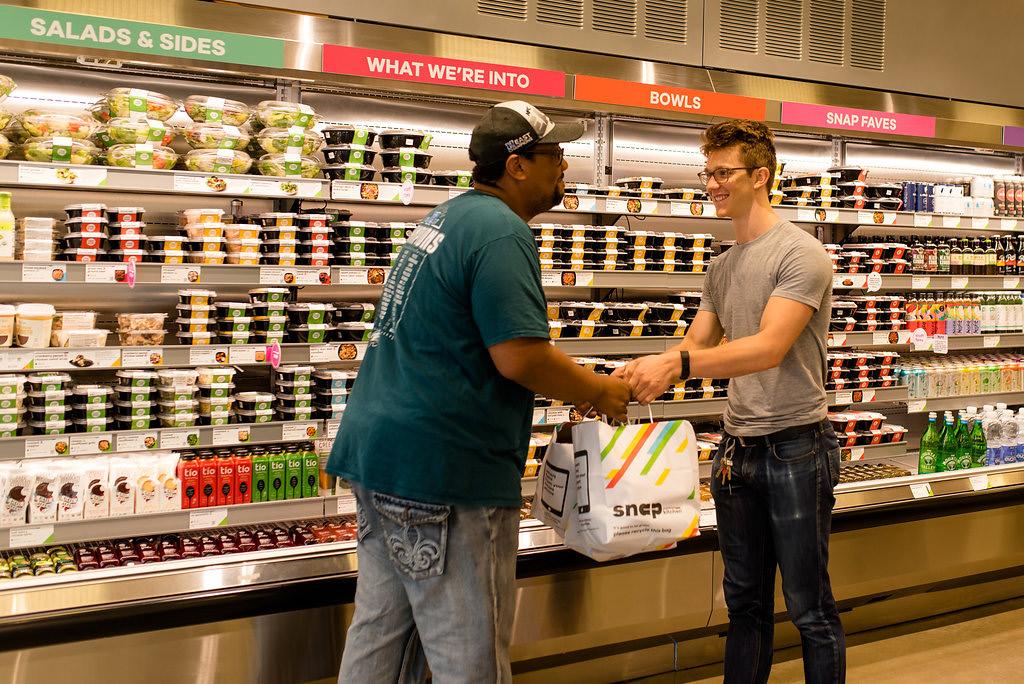
Operations Office of Sustainability Short-Term
Operations Office of Sustainability, EHS, Dept of Public Health
Operations Office of Sustainability, EHS, Dept of Public Health, Commerce Dept, Area Businesses, Institutions
Case Study Food Connect
Short-Term
Medium-Term
Partnership Nonprofits, Grassroots Organizations Short-Term
Partnership Office of Sustainability, Nonprofits, Grassroots Organizations, Area Businesses
Operations Office of Sustainability, Nonprofits, Grassroots Organizations, Dept of Public Health, EHS
Short-Term
Short-Term
Founded in 2014, Food Connect is a Philadelphia-based nonprofit dedicated to bridging the gap between surplus food and hunger. The organization rescues excess food from area restaurants and food retailers and redirects the food to local community organizations that provide hunger relief including homeless shelters, senior centers, family resource centers, veteran facilities, and soup kitchens. Food Connect’s technology makes it easy to request a pick-up of food to be donated or to sign up to receive food. Food Connect’s model fills critical gaps in our food system so that procurement, distribution, and feedback loops can happen seamlessly at scale while leveraging hyper-local networks. They also work with organizations to streamline their food programs so that more people can gain access to healthy, nourishing food while also eliminating food waste within those programs and tapping into local businesses to provide culturally appropriate food. Food Connect’s circular economy solution allows for all segments of the food system to work more cohesively and sustainably together to ultimately build healthier, more sustainable communities.
Visit
PEOPLE AND LABOR ARE THE POWER THAT RUNS EACH PART OF PHILADELPHIA’S FOOD SYSTEM

The goal is to recognize the role urban agriculture can play in the lives and livelihoods of people and communities.
6. PEOPLE








